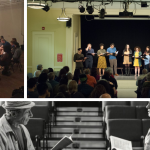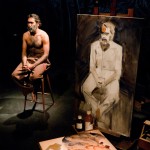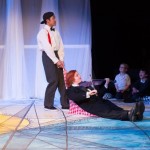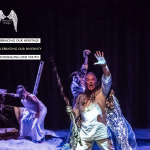Constance
Genre: Comedy Drama
Venue: King’s Head Theatre 115 Upper St Islington LONDON N1 1QN
Low Down
Kate Youde’s article on ‘Oscar Wilde’s Lost Play’ in The Independentin July this year outlines artistic director Adam Spreadbury-Maher’s rationale for producing Constance at the King’s Head. The play is a “major discovery” as it is “the only play written by Wilde…after his fall from success and imprisonment for gross indecency with men. It is a Wilde we have never seen before on stage, and that is why it is so important and ought to be included in his collected works.”
Review
On arriving at the theatre on Friday night, the assumption that Constance should be viewed as a play-within-the-real-life-drama of Wilde’s tragic post-prison life is substantiated by the attached one-pager accompanying the theatre programme: the audience have in their hand a chronology of events from Wilde’s creation of the play’s scenario in 1894 through to the King’s Head Theatre’s realisation of director Marc Urquhart’s current world premiere production.
It is certainly an intriguing history which includes: Wilde’s selling his play to an American actress; her bequeathing of the script to a French writer; the original script destroyed by the French resistance during WW2; then author and theatre critic Charles Osborne’s translation of the French back into English in 1994. It is this reconstitute text that Marc Urquhart uses for his production. So how can it be, as Urquhart claims, a ‘new, untouched and virgin’ play by Oscar Wilde? Wilde’s son stated in 1954 that “the dialogue has the authentic stamp of my father” while, according to Kate Youde, John Stokes, emeritus professor of English at King’s College, urges “caution about assuming these were Wilde’s exact words.”
While the authentication of Oscar Wilde exact words are disputed, what seems clear from the direction, the design and the performances ofConstance is that it is a production revelling in the style of Oscar Wilde: the drawing room setting, the fin de siècle costumes and the clearly drawn portrayal of class and gender through characters whose satirical quips rarely miss their intended targets. Just as in Importance Of Being Earnest and Ideal Husband, the dialogue is simultaneously acerbic, witty and stunningly insightful.
The strength of the current production is the strong ensemble of ten actors who clearly understand comic timing: the placement of their characters’ conscious remarks and unconscious revelations is very well done. The roles that stand out are the Duchess by Tamara Hinchco, Daventry by James Vaughan and the Reverend George by Bradley Cole: but really each and every actor makes a strong impression. Elle Beaven’s Constance is a clearly defined portrayal of a ‘good woman’ in an ensemble of hard and showy others like Deborah Blake as Lady Virginia (widow of the Duchess’s older son) and Delia (the former chorus girl and now wife of Reverend George). Both the laughter and gasps of horror at the many sexist and racist comments throughout the play showed that the audience was kept entertained.
But there is nothing novel about the interpretation of the play: the presentation of the late nineteenth century is familiar to us andreconfirms assumptions of that era as one of suppressed sexual desire, the emergence of the ‘new woman’ and of class struggle. Though, even by the impossibly high moral standards of that time, the world of the play seems even more extreme: one in which marital relationships are the most impossible if you want to be happy and sexually fulfilled.
For this reason, Urquhart’s choice to stay with Wilde’s usual naturalistic style doesn’t quite make sense. If, as he proposes there’s “nothing else like” Constance in Wilde’s collected works, then why not exploit the play’s extreme presentation of disastrous marriages through non-naturalistic dramaturgical effects?
Ellie Beaven’s portrayal of Constance’s as the ‘ideal wife’ is unproblematic and modern as a woman who comes into her own desires and finally acts on them: a kind of Nora Helmer of theDoll’s House who gets to have a life! But what is the audience to do with the fact that she achieves her new life only through her patroness the Duchess? What of the fact that she goes from one rich husband to another: from Daventry the rich industrialist to Gerald, the Duchess’s second son and only heir? What exactly is her ‘constancy’ in such a hypocritical society? Why not push the issue of the complicity of women as ‘God’s police’ in such a repressed society? Despite Urquhart’s reference to the matter in its publicity, the director doesn’t give expression to Wilde’s vision of the society that imprisoned him for his sexuality.
From the reactions I heard around me, the audience seemed to recognise characters as Oscar Wilde ‘types’: the matriarch Lady Bracknell type for the Duchess and the youthful lovers for Constance and Gerald. But the characterisation remained only stereotypical as most relationships remained undeveloped. How does the sweet Constance get together with the crass Daventry or the chorus girl Delia with the Reverend George? The contrasting coupling seemed more like caricatures of Wilde’s great plays which made the play seem rather lengthy and pointless
I applaud King’s Head Theatre’s for staging this very interesting ‘new’ Wilde play and I believe that its strong cast of actors will make the production tighter and more edgy as the season continues. But, I don’t believe that the vision of the production as a ‘different’ kind of Wilde play has been fulfilled. I remain intrigued how the playwright’s art was changed after spending two years in prison for his private sexual pleasures.
Reviewed by Josey De Rossi Friday 16th September 2011
Website :
http://www.kingsheadtheatre.com/main.html
I would like to record the appreciative ‘ahhh’ from dog-lovers in the audiences as Tickets Doreen Edna Spreadbury-Maher entered the stage





